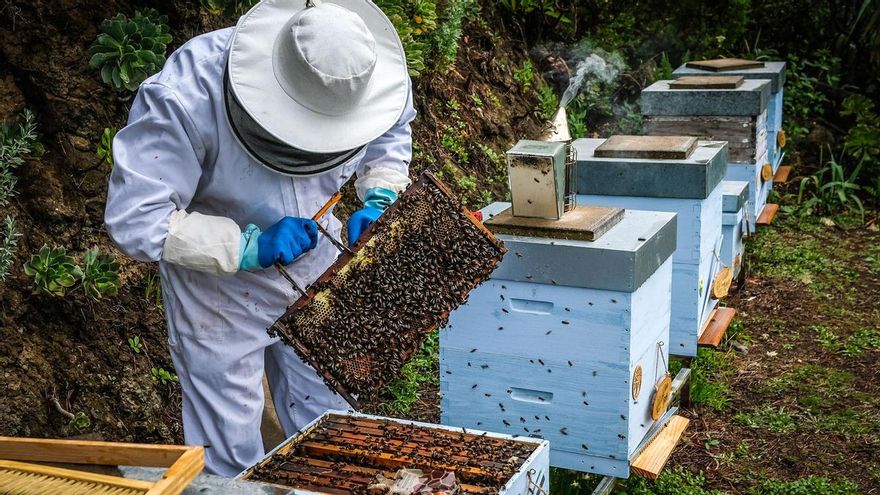
The beekeeping industry in the Canary Islands recorded a decrease in the number of registered hives in 2024, marking the second consecutive year of decline. Currently, there are 33,733 hives, which is one thousand fewer than the previous year. This is a reduction from nearly 35,000 in 2022. The reasons for this ongoing decline include drought, the introduction of foreign bee species, and various bee diseases.
INTRODUCTION OF THE FOREIGN BEE
Last year, Gran Canaria lost 793 hives, La Gomera 285; La Palma 78, and Fuerteventura 8. In contrast, El Hierro has seen an increase in its bee population, rising from 748 hives to 913, a 22.1% increase compared to the previous year and 49% more than in 2022. Is it a miracle? More accurately, it can be attributed to the introduction of the Buckfast bee from England, which is more resilient to diseases and has a higher honey production rate. The island’s Cabildo is promoting its importation for this very reason. However, the problematic scenario is that these new ‘residents’ threaten the native Canarian black bee populations. The issue has reached a head in Las Palmas, where the Gran Canaria Beekeepers Association (Apigraca) brought the matter to the attention of the insular corporation last November.
Apigraca’s spokesperson, beekeeper and biologist Antonio Quesada, has extended this concern to the Canarian government, urging it to “halt immediately the influx of foreign bees to prevent new diseases afflicting native species.”
FORCED TO VACCINATE
The reduction in hives in Gran Canaria is, among others, attributable to “the presence of three imported diseases that are extremely dangerous and severe for the Canarian black bee.” These include American foulbrood, a bacterium that affects the larvae; Varroosis, a mite that also targets young bees; and an unidentified ailment impacting their digestive systems. Regarding the latter, Quesada notes that there is a Comprehensive Health Plan requiring beekeepers to apply medications to their hives annually, as well as to collect waste materials resulting from these treatments, like disposable syringes or surgical instruments. It is akin to managing a pandemic.
FEEDING BEES
“We are experiencing a crisis,” emphasises Quesada. Imported breeds, coupled with the usual lack of rainfall—with recent rains being an anomaly—and the abandonment of the sector, contribute to the current plight. “We have had to feed the bees to keep them alive, as there has been insufficient forage outside the hive due to the lack of flowering that has resulted from the dry conditions,” he explains. This is a labour-intensive process that, under better circumstances with ample flowering and water, would be managed naturally by the bees.
Gomero beekeeper Antonio Herrera elaborates that every 15 to 20 days, they supply syrup made from a kilo of sugar for every litre of water, supplemented with a beekeeping feed—a paste that is rich in glucose and contains protein cakes placed on the honeycombs for the colonies’ nourishment.
However, this ‘artificial’ feeding practice paradoxically leads to reduced honey production. “While we feed them, they do not produce honey themselves, which they require flower nectar and pollen for—they simply lack those resources,” the beekeeper states.
MORE TRADITION THAN PROFITABILITY
“It is no longer profitable to keep the hives; it entails significant sacrifice,” shares Herrera. He has seen a reduction from 200 to 100 bees, adding that many of these are quite compromised and at risk of dying. This situation has prompted him to reconsider his commitment to hive management. “If I continue, it is more for sentimental reasons.”
This sentiment resonates with Pablo Pestana, president of the Tenerife Beekeepers Association (Apiten), who notes that many beekeepers maintain their operations due to family tradition.
SPEEDY RECOVERY
Pestana has been astounded by “the swift recovery of the sector in the areas impacted by the fire.” In El Sauzal, one of the North Tenerife municipalities most affected during the summer of 2023, they have successfully almost restored all of their losses. This is partly thanks to the financial support from institutions, enabling them to acquire new equipment and begin reviving the colonies affected by the fire.
Tenerife alone constitutes 60% of the archipelago’s beekeeping sector, yet Pestana cautions, “Not everything is positive and we anticipate a decline this year; although we haven’t lost colonies, there is a lack of flowering.”
IN DANGER
The beekeepers are hopeful that “the rain from these past days will provide some relief this year and that production will improve slightly.” Nevertheless, the statistics are not encouraging. In Tenerife, 140 tons of honey were harvested in 2012, while last year’s yield was barely seven tons. Regarding Gran Canaria, an Apigranca representative laments that despite “supplying approximately 25% of the total demand on the islands,” they have been forced to forgo access to a robust international market for gourmet honey due to insufficient production.
Currently, the price of 500 grams of honey is estimated between eight and ten euros, a sum that Pestana indicates has “risen in recent years due to the shortage and the high production costs involved.”
















